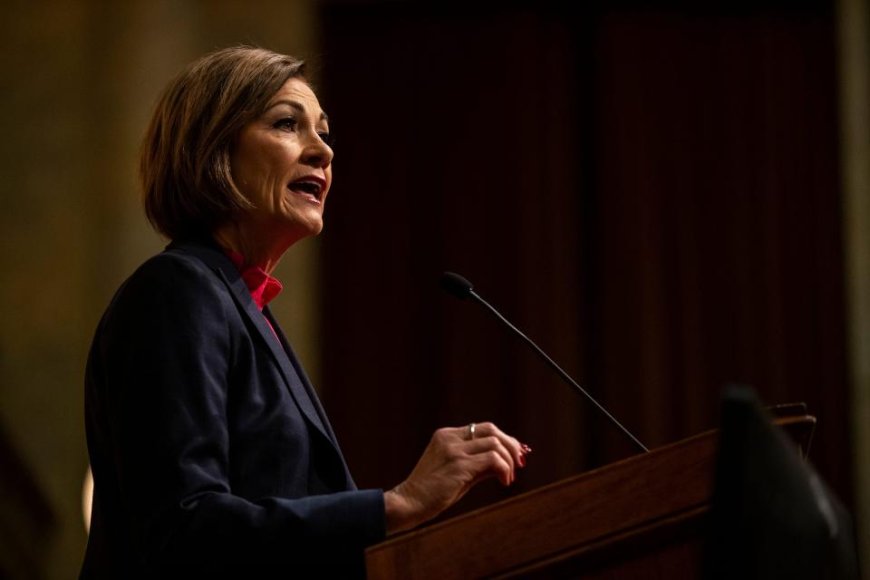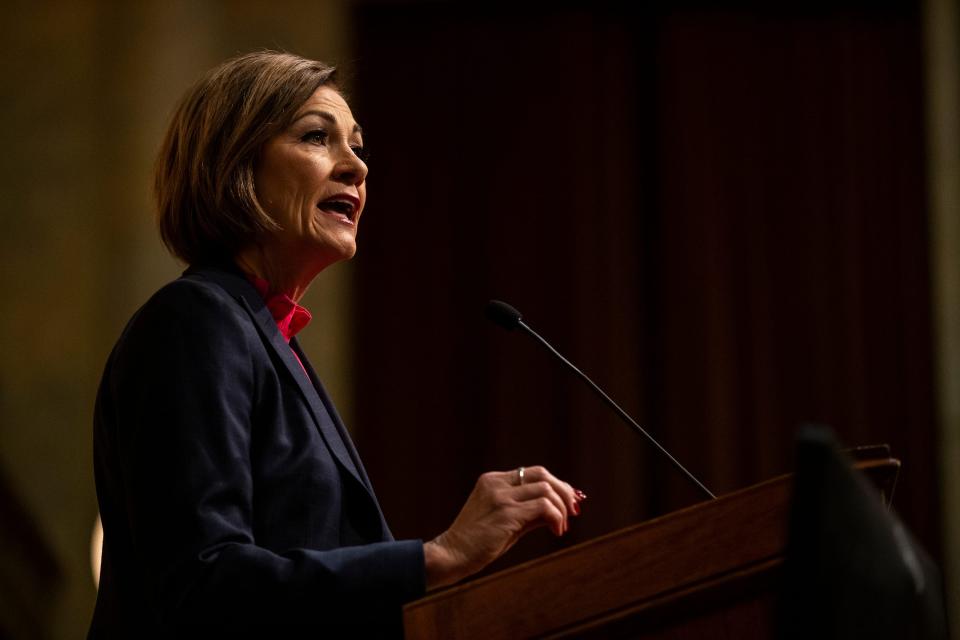Feds crack down on Iowa restaurants after state loosens child labor laws

The Iowa Restaurant Association warns members to follow federal regulations for workers under 16
The Iowa Restaurant Association hailed looser state regulations on teenage workers as a boon for its members in 2023.
Now it’s warning them to revert to following stricter federal regulations for workers under 16, saying regulators are cracking down and levying heavy fines on establishments found to be out of compliance.
In a June 7 weekly update emailed to its members and obtained by the Des Moines Register, part of the USA TODAY Network, the association warns that the Labor Department “is out in full force across the state. They are taking massive punitive action against Iowa restaurants who are following the new state youth employment hours instead of the federal regulation on hours. THEY DO NOT RECOGNIZE OUR NEW STATE LAW. We are encouraging people to revert to federal work hours for teens under age 16 at this time.”
In March 2023, top Labor Department lawyer Seema Nanda criticized child labor laws that states, including Iowa, were considering at the time and warned that “the department has and will continue to vigorously enforce child labor protections across the nation.”
Nanda didn’t specifically name Iowa, but Jessica Dunker, president of the Iowa Restaurant Association, on Tuesday accused the Labor Department of targeting the state.
Labor laws
Republicans push for teenagers as young as 14 to work in restaurants, industrial jobs
Iowa’s new law is less restrictive than federal regulations on a number of counts. But Dunker said the main target of the enforcement push against the 2023 state rule changes, passed by the Legislature and signed by Gov. Kim Reynolds, is a provision concerning work hours for 14- and 15-year-olds.

The Iowa law says they may work as late as 9 p.m. on school nights and as late as 11 p.m. during the summer. But federal law specifies they can work only until 7 p.m. during the school year and until 9 p.m. during the summer.
‘They are literally going to put people out of business,’ restaurant association head says
Dunker said the Labor Department’s Wage and Hour Division has conducted investigations at several Iowa restaurants and levied “tens of thousands of dollars” against those found to be violating the federal requirements.
“They are literally going to put people out of business for having 10th graders work until 9 p.m.,” she said. “I mean, if compliance is the actual question, wouldn’t you come in and say, ‘Hey, look, I know what your state law says, but you need to go back to the federal regulation, and if you do that and we come back in 30 days and you are still doing this, we are going to fine you’? That’s not happening.
“They have picked on my board members. They have picked on my award winners. They have picked on people who are small and don’t have an attorney at the ready. They are on a tour to prove a point.”
Dunker declined to name restaurants that had been inspected and fined or say how many there were, citing what she said is their fear of retaliation and their attempts to negotiate settlements.
Labor Department says child labor law enforcement being carried out nationwide
The Labor Department denies singling out Iowa. It confirmed it has taken enforcement action in Iowa but says it is dealing with violations nationwide.
“While we have done several investigations resulting in child labor violations in Iowa, this problem is not unique to the state,” it said in a prepared statement. “The same violations are occurring nationwide, and we are doing everything we can to find violators and stop them.”
There have been reports of child labor law enforcement actions in Texas, Pennsylvania, California, and North Carolina. The department said it is committed to enforcing child labor provisions of the Fair Labor Standards Act.
“Some state child labor laws differ from the federal child labor provisions of the FLSA. Where a state child labor law is less restrictive than the federal law, the federal law applies,” the statement said. “Where a state child labor law is more restrictive than the federal law, the state law applies. The law that provides the greater protection to the child is the law that prevails.”
It also pointed out that in 2023, it conducted more than 4,500 outreach events involving more than 450,000 participants to ensure businesses understand how to maintain compliance with federal law. The agency also has several online fact sheets, FAQs, and videos to help employers, workers, and parents stay in compliance with federal child labor laws.
Law opponent: Labor Department warned it would enforce the law
Like most other Democrats in the Republican-majority Legislature, Iowa state Sen. Nate Boulton of Des Moines opposed the law. He said the Labor Department had made its position clear last year in response to letters the Democrats sent it about the law.
“They put it plainly in their response to that inquiry to put people on notice … that this would be the approach, and I think they are following through on their commitment to enforce federal protections on child labor,” Boulton said.
He said he was not surprised by the Iowa Restaurant Association’s message advising members to adhere to federal regulations, despite the association’s earlier support for the changes in state law.
“I think they have the duty to make sure that their members are aware of the law and the consequences of legal violations. I just wish they would have done that a year ago,” he said.
On its website, the Iowa Division of Labor lists the changes that took effect July 1, 2023, regarding the hours 14- and 15-year-olds could work under the new law, but at the bottom of the page, it states, “Employers are subject to both state and federal child labor laws and, when there are differences, must follow the law that gives the most protection.”
Child labor bill sponsor says crackdown is politically motivated
State Rep. Dave Deyoe, who sponsored the child labor bill in 2023, said some of the changes regarding the number of hours a teenager is allowed to work could help both the workers and the employers.
“Let’s say you’ve got a 15-year-old working at a Dairy Queen, you know, and the Dairy Queen is open until 9 at night, so they had to leave before the store was closed, and that made it very difficult to hire kids that age if they can only work for three or four hours after school,” Deyoe said. “This allowed them at least the opportunity to be able to work until later in the evening on a given night.”
Deyoe said he believes the federal enforcement push is politically motivated.
“I think this is more of a punitive action by the Biden administration who didn’t like it when we passed this law,” he said.
His solution also is political.
“Maybe just a change in administrations,” he said, referring to the presidential election that will pit Democrat Biden against Republican Donald Trump in November.
Kevin Baskins covers jobs and the economy for the Des Moines Register. Reach him at kbaskins@registermedia.com.
This article originally appeared on Des Moines Register: Iowa child labor laws: Feds fine state restaurants
SDGs, Targets, and Indicators
-
SDG 8: Decent Work and Economic Growth
- Target 8.7: Take immediate and effective measures to eradicate forced labor, end modern slavery and human trafficking, and secure the prohibition and elimination of the worst forms of child labor.
- Indicator 8.7.1: Proportion and number of children aged 5-17 years engaged in child labor, by sex and age group (relevant to the issue of child labor regulations).
-
SDG 4: Quality Education
- Target 4.4: By 2030, substantially increase the number of youth and adults who have relevant skills, including technical and vocational skills, for employment, decent jobs, and entrepreneurship.
- Indicator 4.4.1: Proportion of youth and adults with information and communications technology (ICT) skills, by type of skill (relevant to the issue of youth employment).
Table: SDGs, Targets, and Indicators
| SDGs | Targets | Indicators |
|---|---|---|
| SDG 8: Decent Work and Economic Growth | Target 8.7: Take immediate and effective measures to eradicate forced labor, end modern slavery and human trafficking, and secure the prohibition and elimination of the worst forms of child labor. | Indicator 8.7.1: Proportion and number of children aged 5-17 years engaged in child labor, by sex and age group. |
| SDG 4: Quality Education | Target 4.4: By 2030, substantially increase the number of youth and adults who have relevant skills, including technical and vocational skills, for employment, decent jobs, and entrepreneurship. | Indicator 4.4.1: Proportion of youth and adults with information and communications technology (ICT) skills, by type of skill. |
Analysis
-
Which SDGs are addressed or connected to the issues highlighted in the article?
The issues highlighted in the article are connected to SDG 8: Decent Work and Economic Growth and SDG 4: Quality Education.
-
What specific targets under those SDGs can be identified based on the article’s content?
- Under SDG 8, the specific target is Target 8.7: Take immediate and effective measures to eradicate forced labor, end modern slavery and human trafficking, and secure the prohibition and elimination of the worst forms of child labor.
- Under SDG 4, the specific target is Target 4.4: By 2030, substantially increase the number of youth and adults who have relevant skills, including technical and vocational skills, for employment, decent jobs, and entrepreneurship.
-
Are there any indicators mentioned or implied in the article that can be used to measure progress towards the identified targets?
Yes, there are indicators mentioned in the article that can be used to measure progress towards the identified targets:
- Indicator 8.7.1: Proportion and number of children aged 5-17 years engaged in child labor, by sex and age group (relevant to the issue of child labor regulations).
- Indicator 4.4.1: Proportion of youth and adults with information and communications technology (ICT) skills, by type of skill (relevant to the issue of youth employment).
Source: sg.news.yahoo.com








